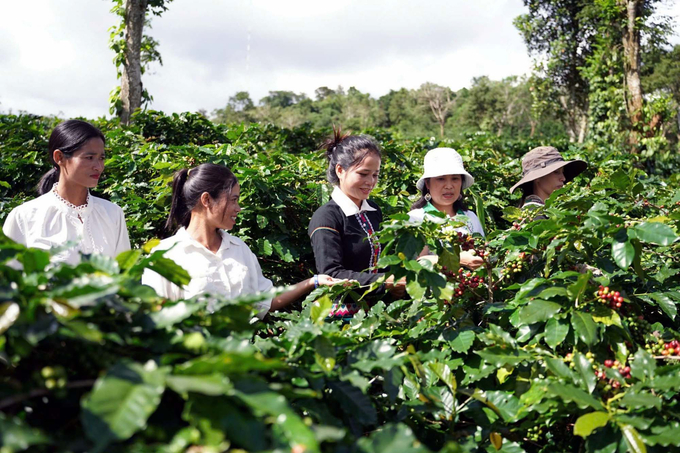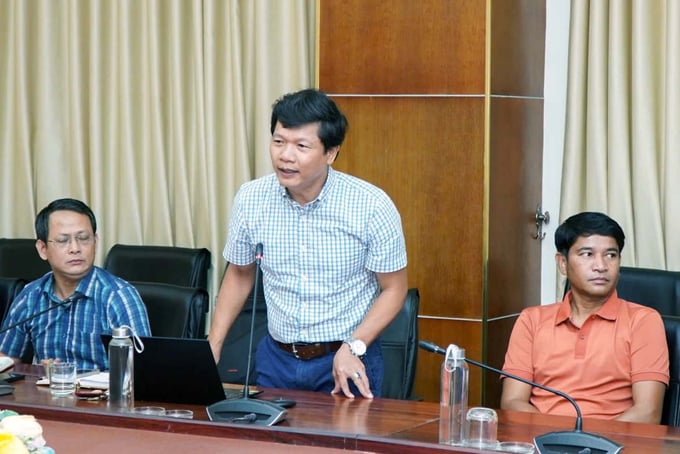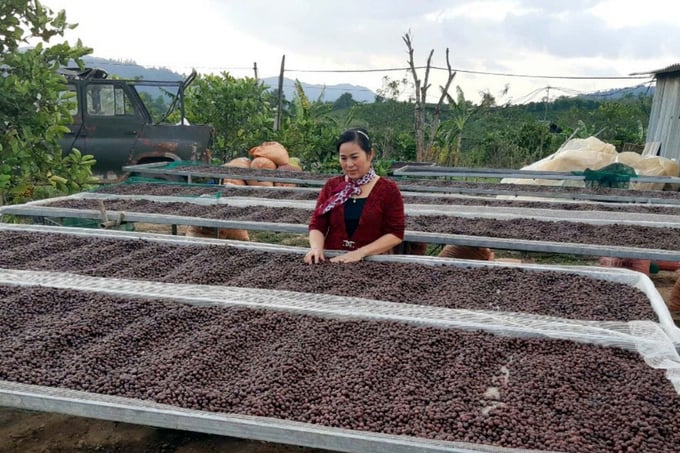June 19, 2025 | 03:56 GMT +7
June 19, 2025 | 03:56 GMT +7
Hotline: 0913.378.918
June 19, 2025 | 03:56 GMT +7
Hotline: 0913.378.918

Quang Tri holds significant export potential with over 3,700 hectares of coffee production area. Photo: Vo Dung.
In August 2023, the Quang Tri Provincial People's Committee approved the Project "Prosperous Farmers and Forests Partnership," funded by the World Wide Fund for Nature-Vietnam (PFFP Project). The Committee also approved the overall activity plan for the PFFP Project, whereby Slow Vietnam Co., Ltd. (Slow Vietnam) is the commercial partner responsible for implementing the Project "Prosperous Farmers and Forests Partnership."
As part of the PFFP Project, Slow Vietnam, as a commercial partner, has committed to producing, processing, and exporting 1,000 tons of green coffee to international markets annually from 2023 to 2027. The company also plans to convert 2,500 hectares of monoculture coffee production area into agroforestry systems, with the participation of 2,000 households. The project's success will help increase coffee farmers' incomes by 40% and protect 18,000 hectares of natural forest in the province's biodiversity corridors within various nature reserves.
Slow Vietnam plans to execute the project in two phases. Accordingly, the company will build a processing plant to convert harvested coffee cherries into green coffee at the Nam Dong Ha Industrial Park in 2024. Subsequently, the company will construct a fresh coffee cherry processing plant in Huong Hoa District in 2025.

A representative from Slow Vietnam Co., Ltd. addressing challenges in building the production and consumption chain for coffee products in Quang Tri Province. Photo: Vo Dung.
On September 17, Slow Vietnam held a meeting with the Quang Tri Provincial People's Committee and relevant local departments and agencies to discuss the development progress of the local coffee production and consumption chain.
A representative from Slow Vietnam reported that the company collaborated with two cooperatives, one processing business, and 150 member households in Huong Hoa District to purchase 106 tons of Arabica coffee cherries during the last two months of 2023. By mid-2024, the company had formed farmer groups registered under the agroforestry model and begun supplying fresh coffee cherries. They also initiated asset transfer procedures and applied for land leases to build a processing plant at Nam Dong Ha Industrial Park.
However, several challenges have arisen during the project implementation process. The investment and construction procedures for the Arabica green coffee processing plant at Nam Dong Ha Industrial Park are currently in progress, which affect the purchasing and processing activities planned for the 2024 harvesting season. Additionally, Slow Vietnam is unable to designate a location for the fresh coffee cherry processing plant in Huong Hoa District, scheduled for 2025. The number of registered farmers and the volume of fresh coffee cherries supplied to Slow Vietnam account for only 20% of the target for the 2024 crop.

Quang Tri Province must address challenges to promote its export of coffee. Photo: Vo Dung.
Ha Sy Dong, Vice Chairman of the Quang Tri Provincial People's Committee, praised Slow Vietnam's mechanisms and policies in building a production and consumption chain for coffee products. He requested the Department of Natural Resources and Environment and the Provincial Economic Zone Management Board to actively support investors through the land lease and investment licensing procedures to begin the Arabica green coffee processing plant's operation in Nam Dong Ha by the end of 2024. The Department of Natural Resources and Environment is also responsible for coordinating with other departments and local governments to assist cooperatives and businesses in Huong Hoa District. They will support local stakeholders in acquiring environmental permits and developing land use planning to meet the requirements for participating in Slow Vietnam's coffee supply chain.
Vice Chairman Dong also instructed the Department of Agriculture and Rural Development to collaborate with other local agencies and investors to assess the needs of cooperatives, businesses, and individual coffee farmers. This assessment aims to facilitate the approval of linkage plans in accordance with regulations. On the other hand, Huong Hoa District is responsible for reviewing its land use planning and identifying suitable locations to facilitate Slow Vietnam Co., Ltd. in proceeding with investment procedures for the fresh coffee cherry processing plant.
Quang Tri Province houses over 3,700 hectares of coffee, with 3,400 hectares currently in production and 250 hectares under the agroforestry model. The province boasts an annual output of 35,000 tons of fresh cherries. Huong Hoa Arabica coffee has qualified for collective trademark protection under the "Khe Sanh" brand. By 2027, Quang Tri aims to establish 2,000 hectares of coffee production area under the agroforestry model, 150 hectares of organic coffee production area, and 60 hectares of specialty Arabica coffee production area in Huong Phung Commune.
Translated by Nguyen Hai Long
/2025/06/17/2344-1-131758_261.jpg)
(VAN) Amid tariff risks and growing trade barriers in the U.S. market, Australia is emerging as a promising destination to sustain the growth momentum of Vietnam's shrimp exports.
/2025/06/17/2013-1-nongnghiep-112009.jpg)
(VAN) This notable growth trend reflects the global taste for fresh, nutritious fruits and the expanding use of lychees across various sectors.

(VAN) The political and cultural insulation of Japan’s beloved grain is falling apart, and experts warn the country’s relationship with the staple will have to adapt.

(VAN) Noting risks, report examines impacts of avian influenza, changing trade patterns since 2022, fish fraud, and shipping industry’s net-zero goals.

(VAN) Mr. Tran Quang Bao, General Director of the Forestry and Forest Protection Department, met and worked with the International Wood Products Association to promote cooperation in the field of timber trade.

(VAN) China's outbound shipments of rare earths in May jumped 23% on the month to their highest in a year, though Beijing's export curbs on some of the critical minerals halted some overseas sales.

(VAN) To sustain capital flow, administrative reform alone is not enough; what farmers truly need is an ecosystem where both government and businesses grow together in support.